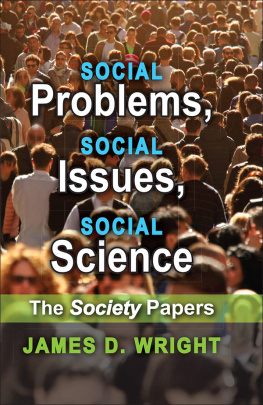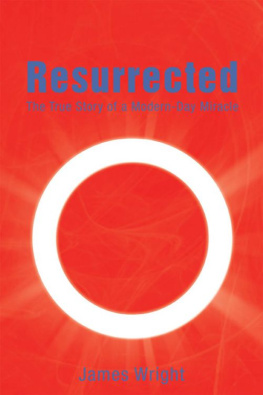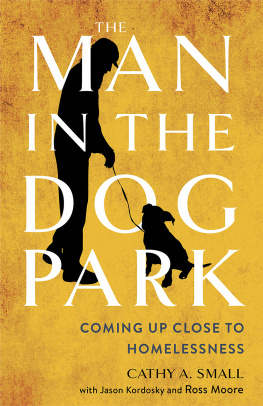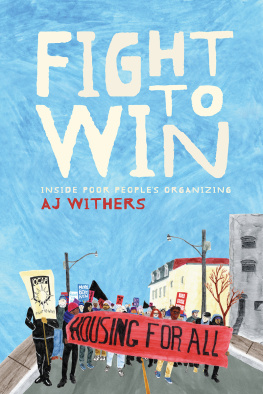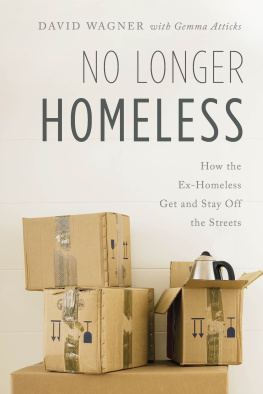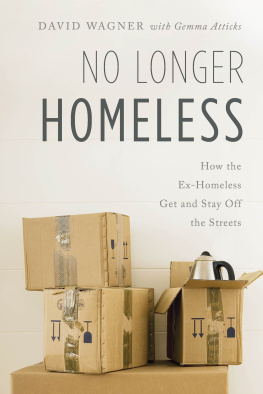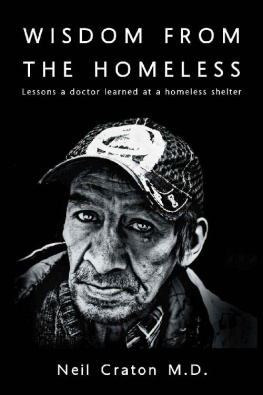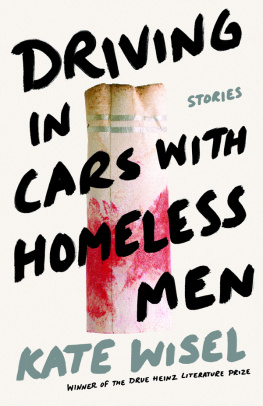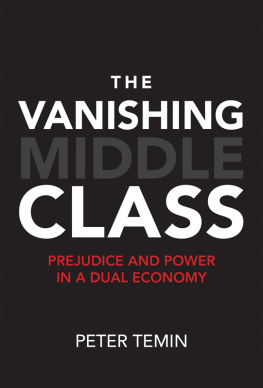First published 2011 by Transaction Publishers
Published 2017 by Routledge
2 Park Square, Milton Park, Abingdon, Oxon OX14 4RN
711 Third Avenue, New York, NY 10017, USA
Routledge is an imprint of the Taylor & Francis Group, an informa business
Copyright 2011 by Taylor & Francis.
All rights reserved. No part of this book may be reprinted or reproduced or utilised in any form or by any electronic, mechanical, or other means, now known or hereafter invented, including photocopying and recording, or in any information storage or retrieval system, without permission in writing from the publishers.
Notice:
Product or corporate names may be trademarks or registered trademarks, and are used only for identification and explanation without intent to infringe.
Library of Congress Catalog Number: 2010043864
Library of Congress Cataloging-in-Publication Data
Wright, James D.
Poor and homeless in the Sunshine State : down and out in theme park nation / James D. Wright and Amy M. Donley.
p. cm.
Includes bibliographical references and index.
ISBN 978-1-4128-4221-1
1. Poverty--Florida. 2. Homelessness--Florida. 3. Florida--Economic conditions--21st century. 4. Florida--Social conditions--21st century. I. Donley, Amy M. II. Title.
HC107.F63P627 2011
362.509759--dc22
2010043864
ISBN 13: 978-1-4128-4221-1 (hbk)
Acknowledgements
Much of the work reported in the following pages involved faculty and student collaborators from the UCF Department of Sociology. Where appropriate, we have acknowledged these collaborations by denoting our fellow travelers as co-authors of the various chapters, both in the table of contents and in the endnotes appended to chapter titles. A special note of gratitude is due Lindsey Singer, whose assistance was invaluable in preparing the index. Most of the research reported here is based on studies we have done through the auspices and in the facilities of the Coalition for the Homeless of Central Florida, and while much of this work has been in the service of the Coalition and its information needs, some of it was made possible by the willingness of the Coalition to let us scratch where we itched. The two Coalition CEOs under which we have done this work, Robert Brown and Brent Trotter, and their respective Directors of Program Services, Jose Irizarry and Daune Brittlebank, have always been gracious and accommodating hosts, even when our projects brought a dozen or more people under foot. The Coalition staff at all levels has also been delightful to work with over the years.
Numerous people have taken the trouble to review earlier versions of these chapters and make innumerable suggestions for improvement, nearly all of which we have followed. We are pleased to extend our thanks for this assistance to David Raymond, Cathy Jackson, Jean Worrall, Jana Jasinski, Ray Nelson, and several anonymous reviewers. Our friends at Transaction Publishing have also been wonderfully encouraging and tough-minded critics. Special thanks to Mary Curtis and Irving Louis Horowitz for everything they have done, not just for us but for the social sciences as a whole.
Our research has been financially supported by a number of local government agencies, non-profit organizations, and public-private entities, among them Workforce Central Florida, the Heart of Florida United Way, Orange County Government, the UCF Metropolitan Center for Regional Studies, Metroplan Orlando, the Coalition for the Homeless of Central Florida, the Homeless Services Network, the Central Florida Commission on the Homeless, the Orange County Department of Housing and Community Development, the UCF Institute for Social and Behavioral Sciences, and the Miami-Dade County Homeless Trust. It is an honor to acknowledge the support of these organizations and the people who lead them, even as we hasten to absolve them of any responsibility for such errors of omission or commission that the following may still contain.
1
In the Shadow of the Mouse:
Central Florida as Myth, Metaphor,
and Reality
October 1, 1971, the day Walt Disney World opened, was a signal day in the history of Central Florida. The opening was the culmination of eight years of legal machinations, land acquisition, engineering (or as we now say, imagineering), and construction. In those eight years, Disney purchased, mostly through dummy corporations, 27,400 acres of land (about forty-three square miles) in the southwestern part of Orange County, Florida. Once Disney World opened, Orange County and its principal city, Orlando, were transformed, more or less instantly, from a regional backwater economy based largely on citrus, cotton, and cattle into a major national and international tourist destination. Today, nearly fifty million people visit one of the Disney theme parks each year. With total employment near 66,000 employees, Walt Disney World in Orlando is the largest single-site employer in the United States (Koenig 2007; Foglesong 2003).
Disney was soon followed by a succession of other Orlando-area theme parks and tourist attractions (like bees to honey, as Foglesong [2003: 3] puts it): Sea World, Universal Studios, Busch Gardens (in Tampa), the Kennedy Space Center Visitors Complex, the Holy Land Experience (a Biblically-themed attraction). These are the survivors, the parks and attractions that are still with us. Quite a number of others have come and gone: Circus World (opened 1973, closed 1986); Splendid China (opened 1993, closed 2003); Boardwalk and Baseball (opened 1987, closed 1990); the Guinness World Record Experience (opened 2000, closed 2002); Stars Hall of Fame (opened 1975, closed 1984), and on through quite a list. To all the above, add scores of water parks, miniature golf courses, bowling alleys, wax museums, dinner theaters and related attractions, plus all the hotels and motels required to house the influx of tourists, plus all the restaurants to feed them once their frolics are over, plus all the rental car agencies so visitors could get from airport to hotel to theme park and back again, plus all the churches where the pious could seek redemption for their theme-park excesses, plus all the roads and highways necessary to connect the dots and you end up with a pretty big chunk of economic activity. A wag once remarked that the entire post-1971 economy of Central Florida seems to have developed solely to provide an answer to the question, So, what are we going to do the day after we do Disney? To a significant extent, that remains the major economic driver in the region.
Disney itself has also expanded dramatically since the Magic Kingdom opened in 1971. In the years since, the mega-park has added Epcot Center (1982), Typhoon Lagoon, the first of what are now several on-property water parks (1988), MGM Studios (1989), Pleasure Island and Downtown Disney (1989), the Disney Wide World of Sports complex, complete with baseball diamonds, a track-and-field venue, and tennis facilities, the Richard Petty Driving Experience on Disneys own mile and a half race track (1997), and the fourth complete theme park, Animal Kingdom (1998), along with numerous resort hotels. Between the four theme parks, multiple water parks, assorted miniature golf courses, regular golf courses, movies theaters, restaurants, and countless other activities and attractions, the Disney visitor need never leave the property, and in fact is encouraged not to do so. One thing you absolutely cannot do at Walt Disney World is rent a car that you could use to get somewhere else.


